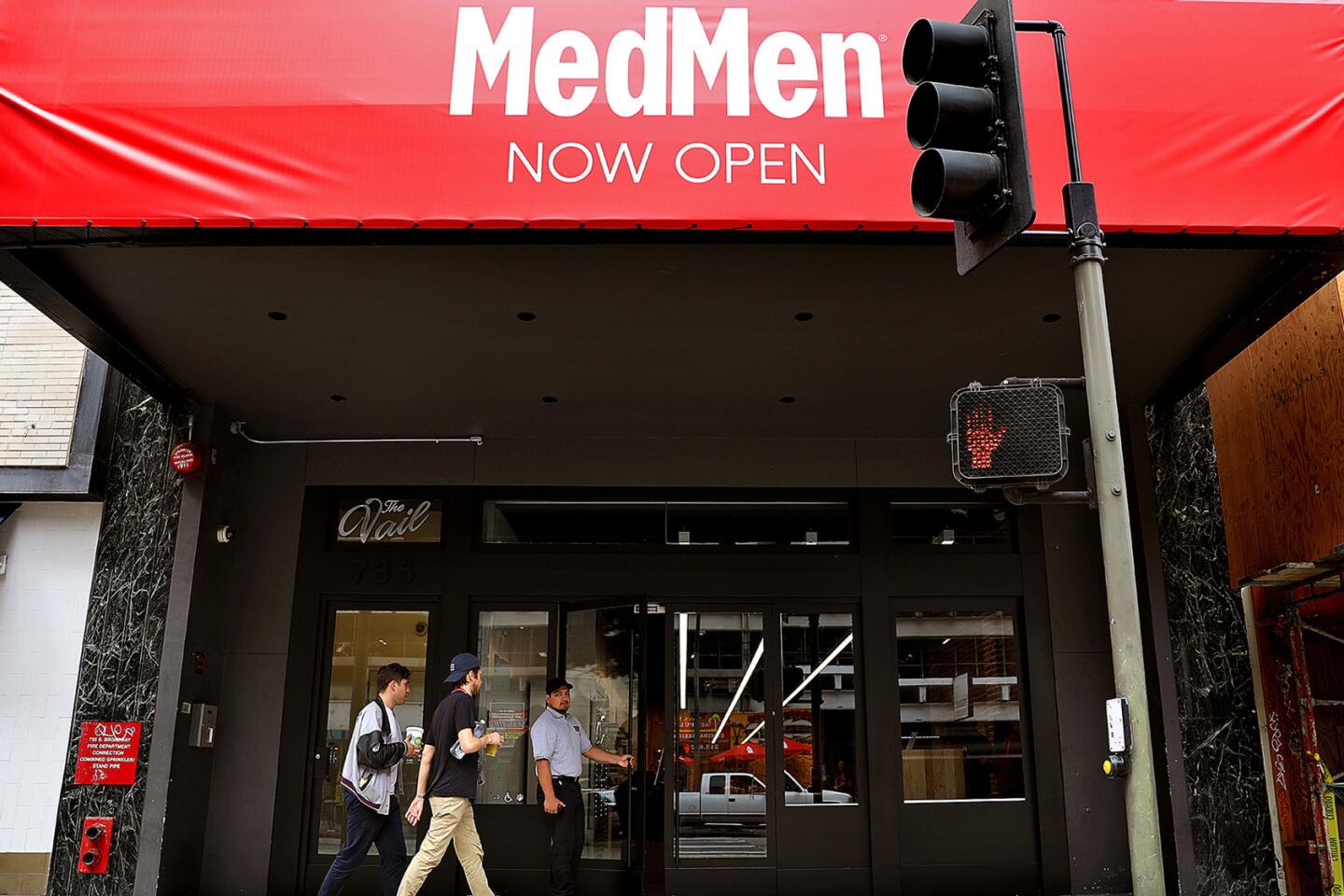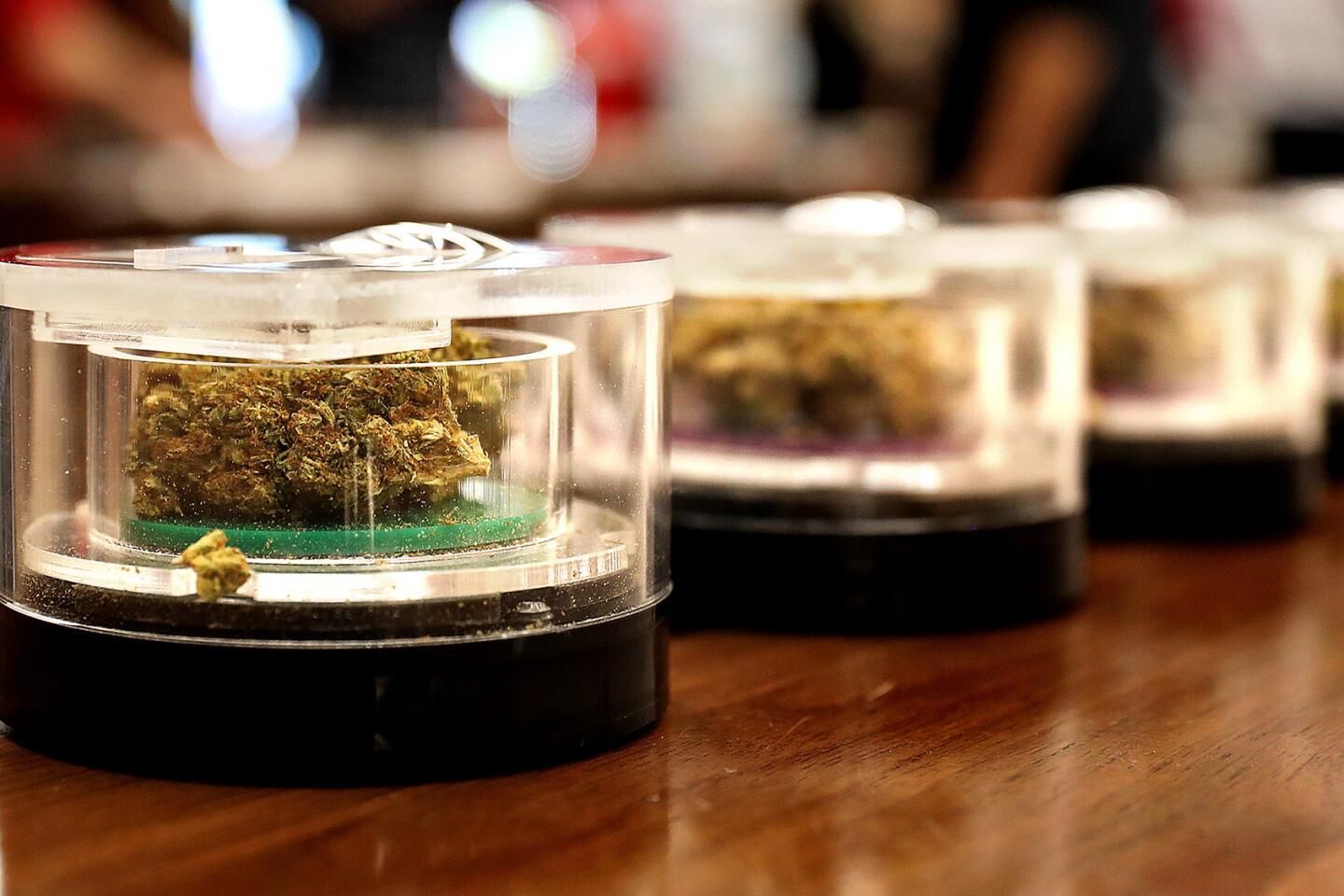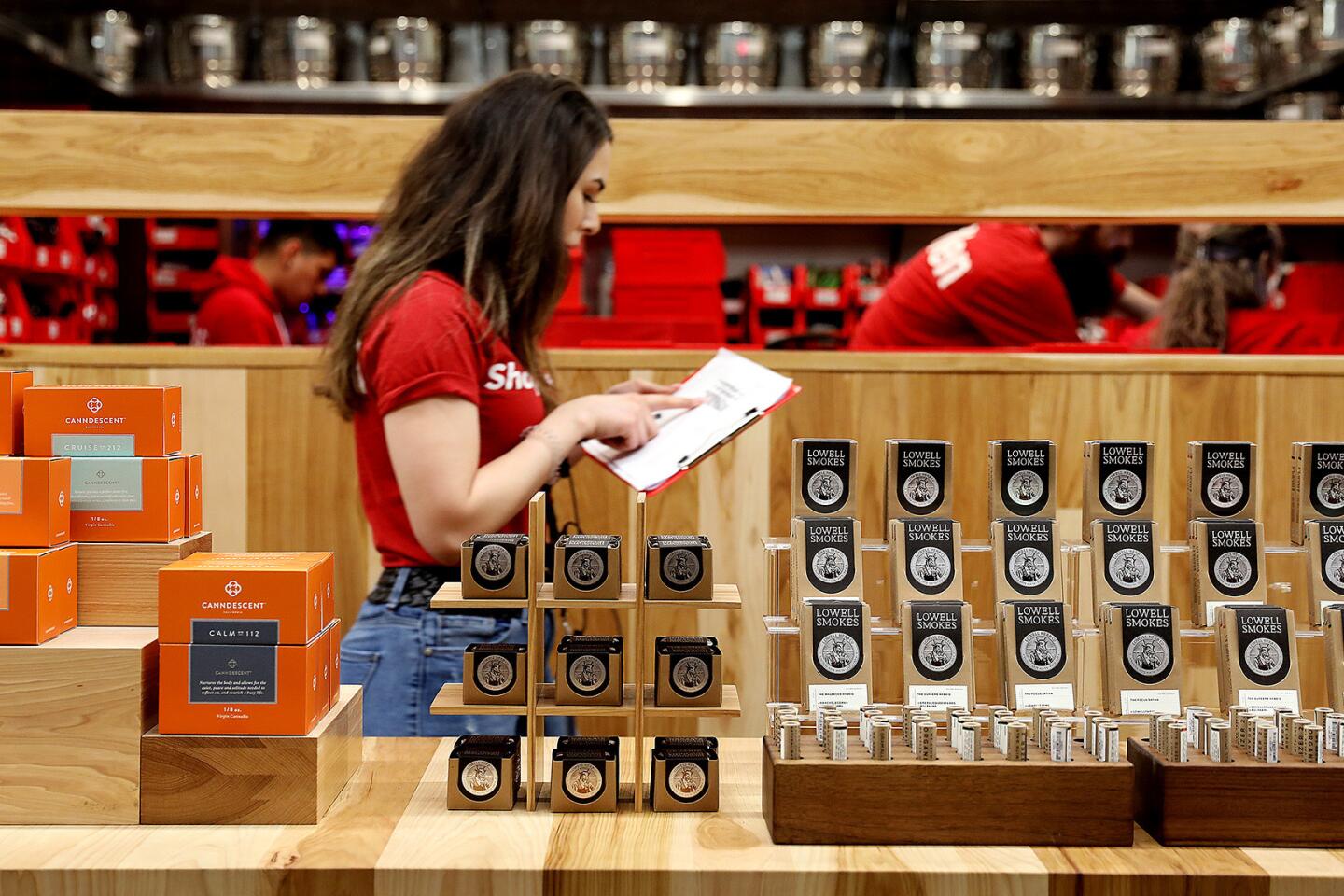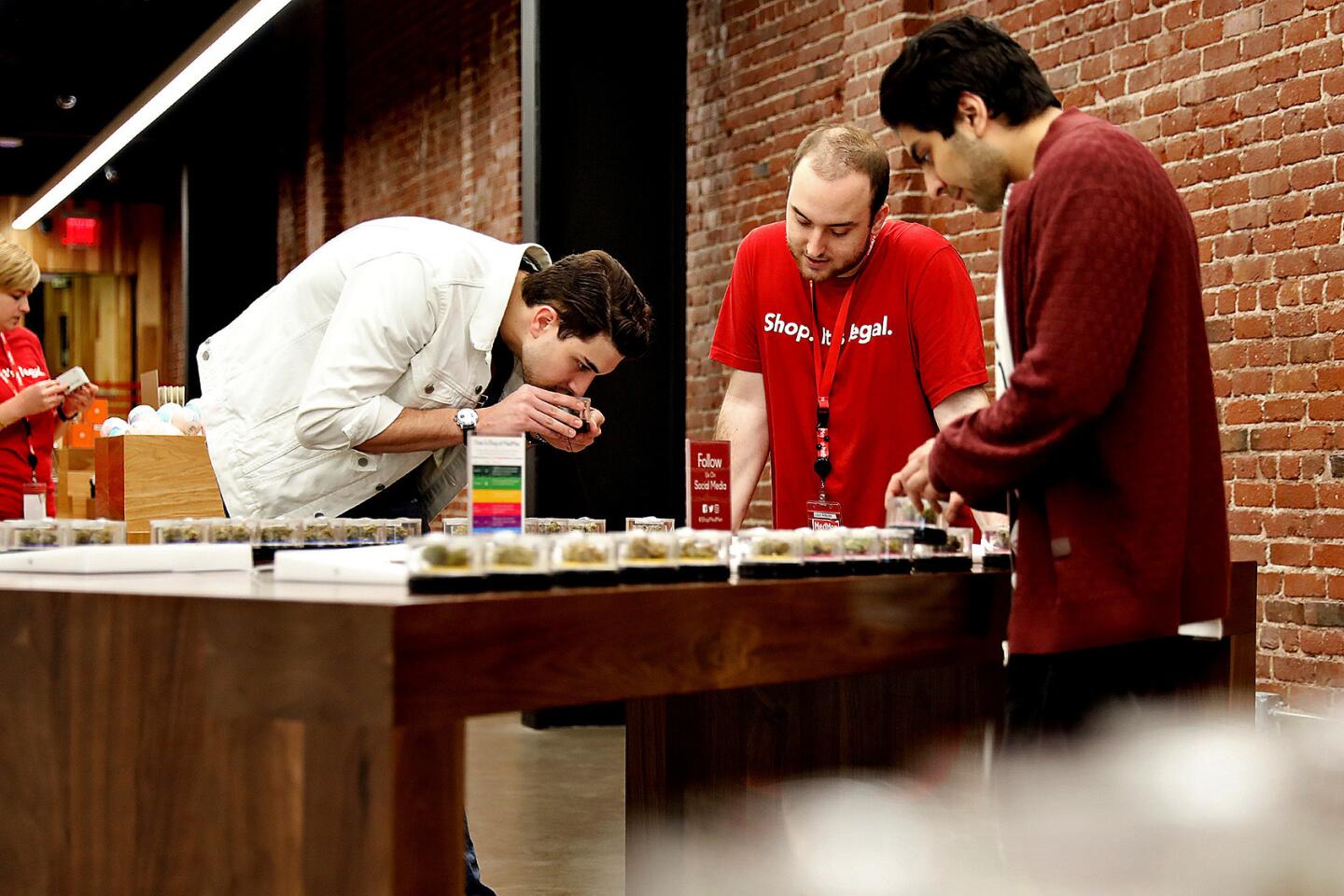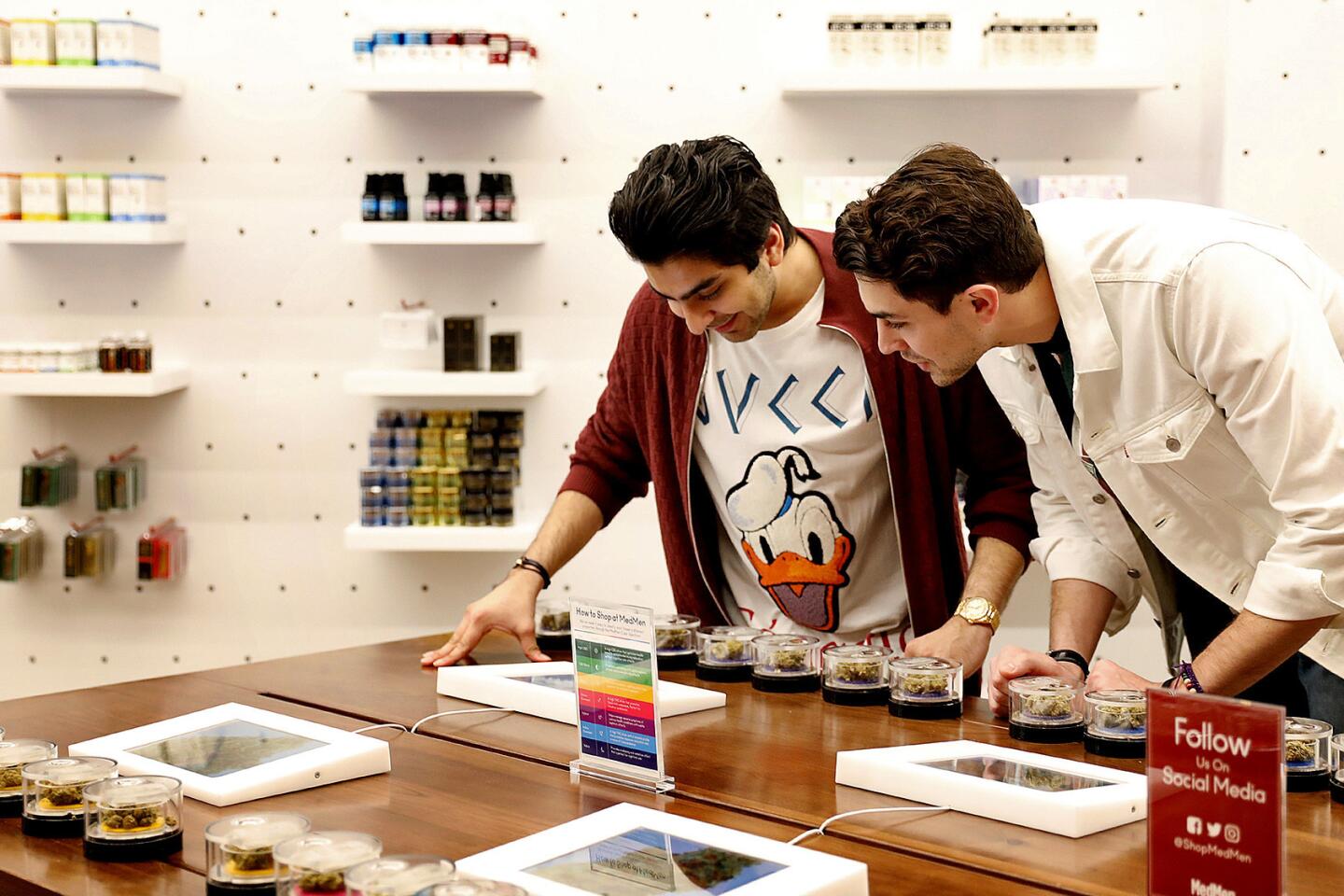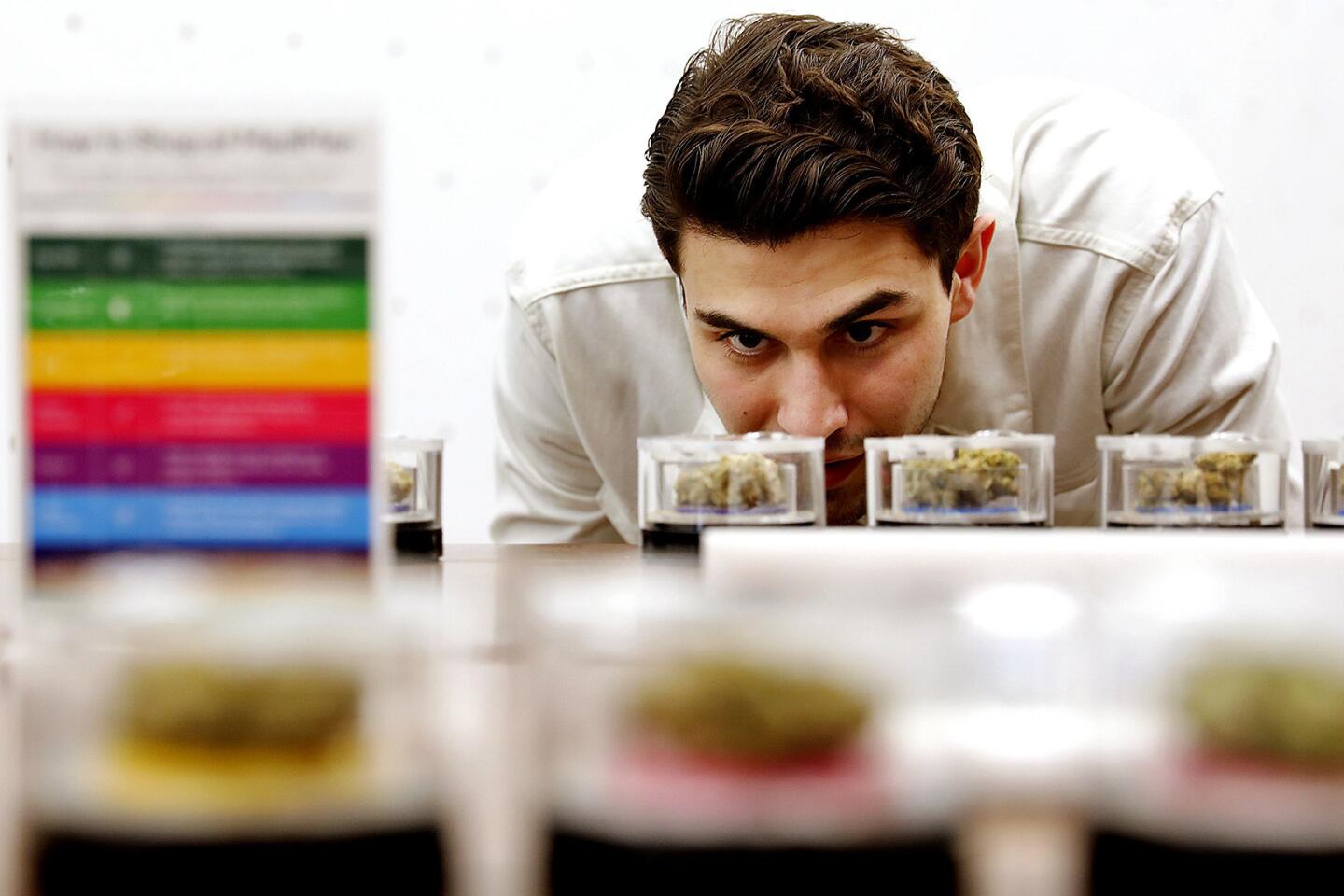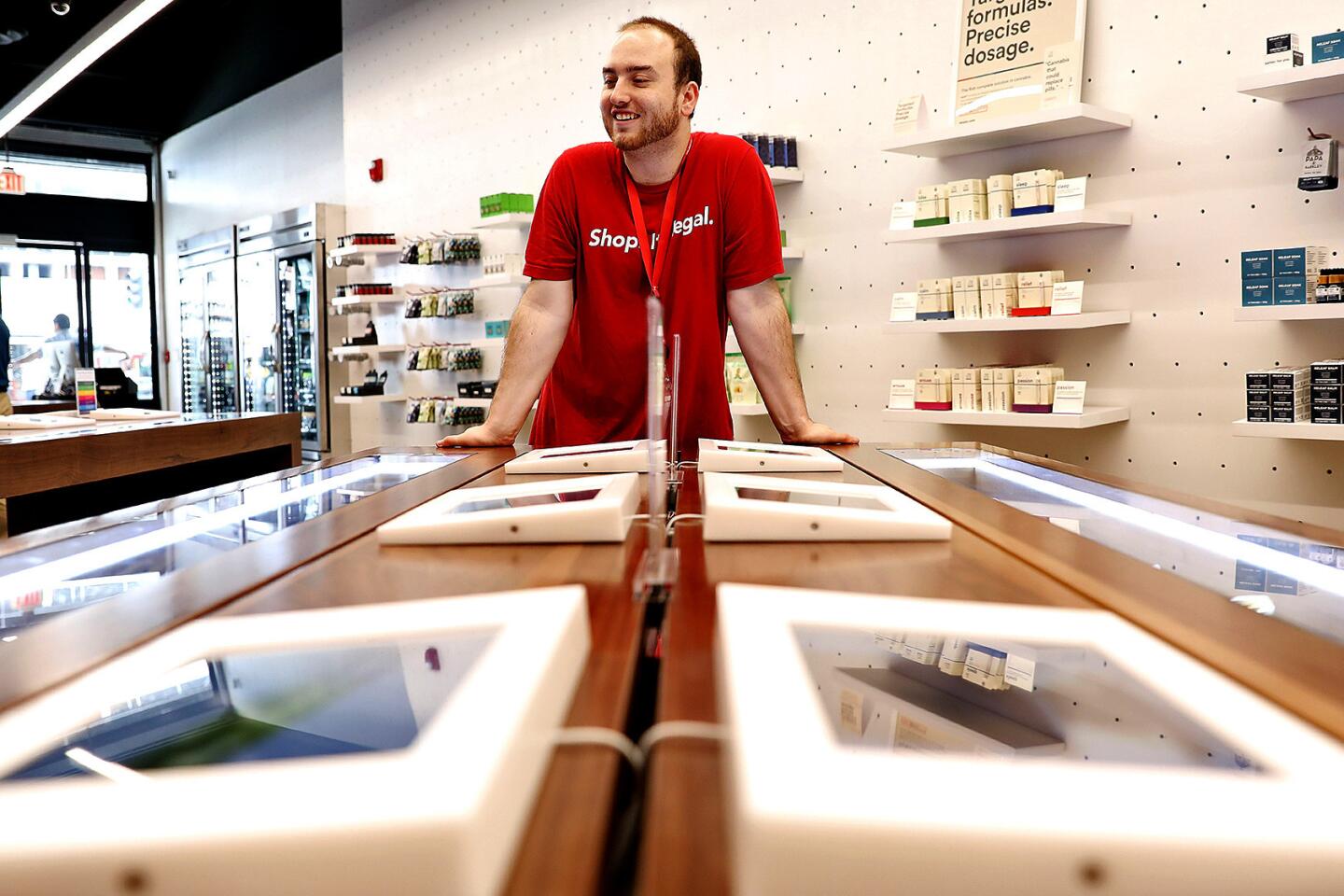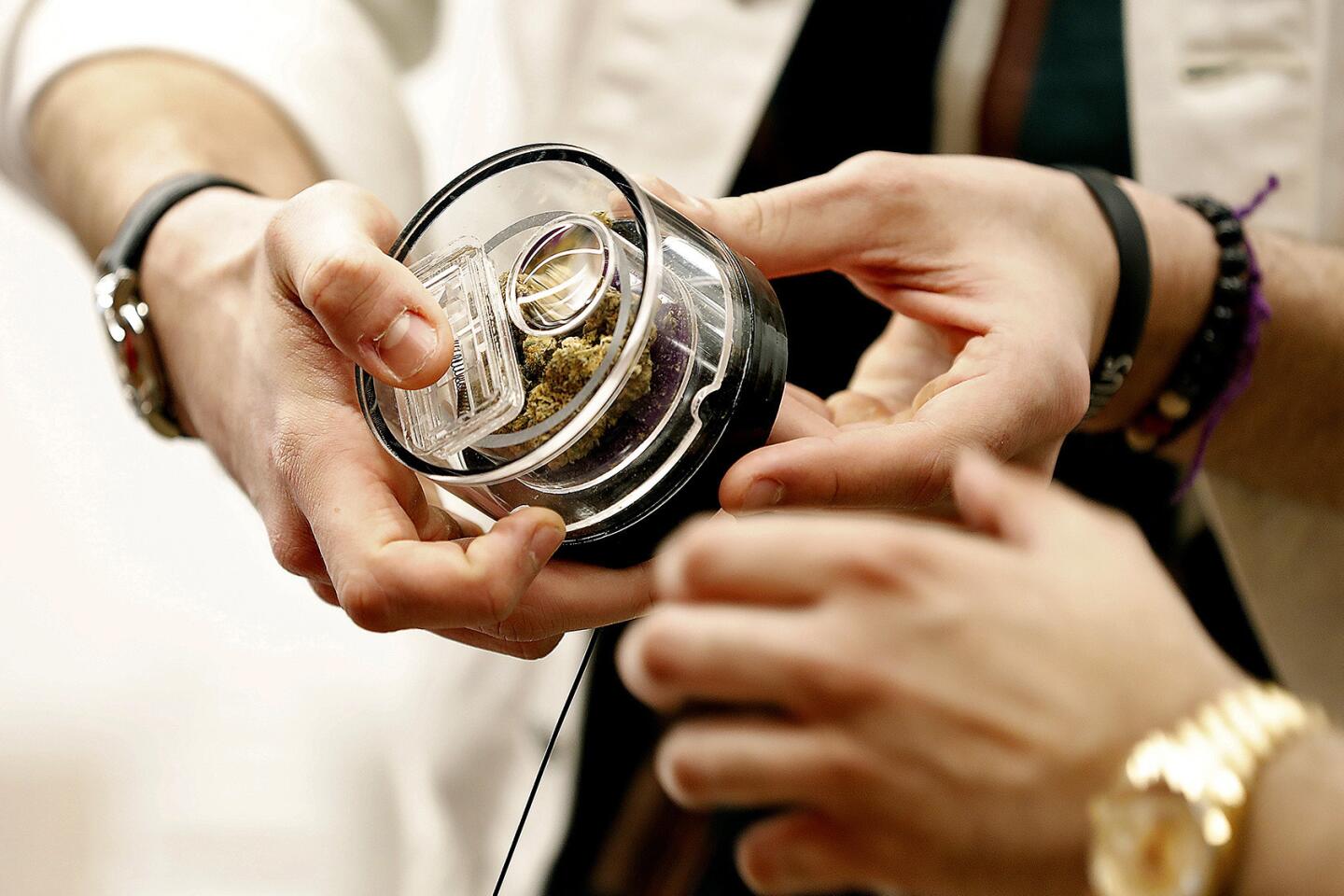Here’s why pot sellers are paying prime rents for warehouse and storefront space

- Share via
Growing up in Minnesota, Stephanie Smith dreamed of being a golf pro. Instead, the mother of five who lives in Pacific Palisades has ended up in the unlikeliest of trades.
She claims to be one of the largest marijuana-industry landlords in the state in a business that is growing chaotically as cities begin to allow recreational pot sales after passage of Proposition 64 two years ago.
For the record:
11:05 a.m. March 31, 2018An earlier version of this article said a bidding war for a 1,600-square-foot Westside storefront ended with the tenant paying $35,000 per month, or $87 per square foot. The rent actually works out to about $22 per square foot, which is high for the area but does not top Rodeo Drive in Beverly Hills as the article had said. The article also said two tenants of Stephanie Smith are paying her a combined rent of $140,000. That figure was for business permitting fees.
And though it has been plenty lucrative for her, the murky legal status of the cannabis industry has led to a police search of her home and to some unflattering news coverage — including a headline that painted her as a drug lord.
“Cannabis is not illegal,” said Smith, who is not shy about what she does. “There is no such thing as a cannabis drug lord.”
But she does boast controlling nearly 2 million square feet of industrial property, mostly in Southern California. Not all of it is rented to the cannabis trade — one of her tenants is Walmart — but she found that cannabis growers can be desirable tenants willing to pay top-dollar rents.
That’s because there’s a race on among formerly underground growers and new entrepreneurs, as well as starry-eyed wannabes, angling to become rich supplying legal pot to Californians who want to get high.
Some are looking for prime storefronts to open often upscale retail shops, or in rare cases, cannabis bars where patrons can indulge on the property. Others want discreet warehouses — the kind of property Smith owns — where they can grow it, but the buildings are already in short supply.
Consider the city of Lynwood, which has lower taxes on cannabis businesses than others in the county, said Los Angeles attorney Aaron Herzberg, who helps retailers obtain cannabis sales licenses and arranges purchases of buildings for growers and manufacturers of cannabis products such as oils and edibles.
Prices for Lynwood industrial buildings were about $107 to $120 per square foot in 2016, he said. Now they are selling for more than $300 a square foot. He expects prices in the region to continue to climb as real estate speculators jump into the market.
“Prices will skyrocket,” Herzberg said. “People are land-banking.”
Smith learned about the demand in 2009 when she bought a former Los Angeles pawn shop that she decided to turn into a laundromat by upgrading the water, gas and power hookups.
Smith advertised the renovated building on Craigslist and got a quick response from a would-be tenant offering double her asking rent if he could use it for growing marijuana. Then another grower offered triple the asking rent.
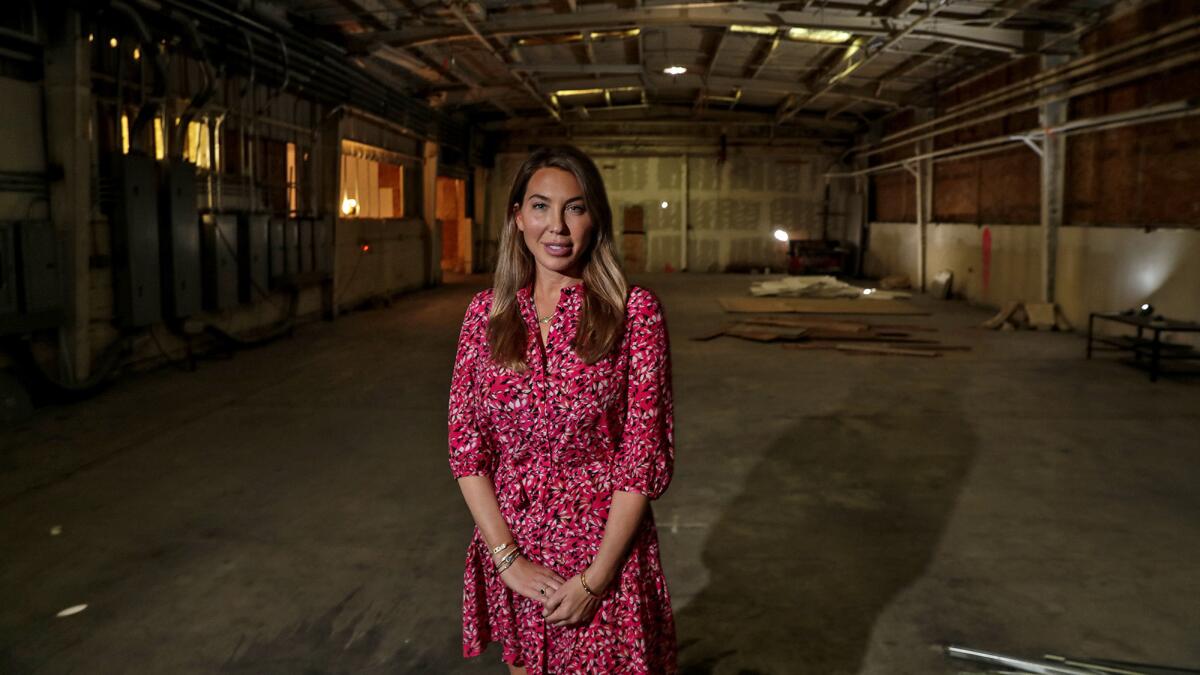
“I set up a bidding war,” she said, and ended up settling for the bidders who came in just under three times her asking rent “because I trusted them to run a professional grow.”
Cannabis growers and processors are good tenants, she decided, describing them as “low-maintenance people who just want to do their jobs without a lot of drama.”
Still, some of her tenants got into a lot of drama in December, when San Bernardino police raided three buildings she owned and confiscated thousands of marijuana plants. They also conducted a surprise search of her Pacific Palisades home the next day and seized her cellphone, she said.
She was not arrested or charged, but got plenty of media attention: “Mom accused of running multimillion-dollar pot-growing operation,” said one headline on a local television station’s website.
She weathered the bad publicity — and then some.
The two tenants that were raided are still in business and paying her rent, she said. This week, she sued the city of San Bernardino to overturn its new law regulating marijuana commerce, which she claims is unconstitutional.
One of Smith’s most prominent tenants is rapper and marijuana entrepreneur B-Real, the stage name of Louis Freese, the frontman of South Gate hip-hop group Cypress Hill and a longtime cannabis advocate.
He recently rented an old warehouse in downtown Los Angeles for his growers and is looking for more space, perhaps miles away in the Mojave Valley.
Aging industrial buildings feel like luxury to marijuana proponents who remember when plants were primarily grown in houses and apartments, he said.
“The warehouse to a cultivator is like a paradise,” said Freese, gesturing with his hands apart, a partially smoked blunt between two fingers.
“It’s hard to find a building that is available,” he said. “People in the know have already jumped on them.”
But the industry these days is up against a renewed effort by the federal government to rein it in.
In January, U.S. Atty. Gen. Jeff Sessions ended an Obama-era federal policy that provided legal shelter for sales in California and five other states that have allowed recreational pot, placing at risk thousands of marijuana businesses operating legally under state laws.
“Sessions caused more confusion in the industry,” said real estate analyst Spencer Levy, head of research in the Americas for property brokerage CBRE.
The federal stance that marijuana is a dangerous drug on par with heroin and LSD discourages conventional banks from doing business with cannabis-related entrepreneurs.
That makes it more challenging to buy or rent the property these entrepreneurs need for their work and keeps big well-known landlords and developers such as publicly held real estate investment trusts out of the business.
Marijuana’s outlaw history and uncertain present also get in the way of retailers’ efforts to sell it over the counter, Levy said. In addition to government rules such as no sales near schools or churches, there are unofficial barriers imposed by owners of upscale shopping centers and other landlords who fear being tainted by association and won’t consider cannabis store tenants.
But such judgmental attitudes probably won’t last long, Levy said, if history is a guide.
“What is considered appropriate retail is a moving target. Bowling alleys and gyms were once out of favor and now are in” with image-conscious landlords, he said. “The pendulum will shift as cannabis becomes as socially acceptable as liquor.”
A Los Angeles-based chain of cannabis stores called MedMen is cultivating just such an acceptable image with well-appointed emporiums, including one in the Broadway Theater District of downtown Los Angeles that an online commenter said looks “like a Starbucks had sex with an Apple store.”
In addition to marijuana samples displayed under glass like desserts, there are cannabis products such as vapor pens, sprays, tongue slips, cookies and soda in elaborate packaging neatly organized on shelves for customers to pick up and examine.
Music plays in the background as T-shirted staffers assist customers and offer recommendations. Impulse items such as machine-rolled joints sit temptingly next to the cash registers, and tipping is an option when paying with your debit card.
“We are not reinventing retail. It’s a known science,” MedMen spokesman Daniel Yi said. “We’re bringing it to marijuana.”
Stores like MedMen have more in common with boutiques than bars. Anyone older than 21 can walk in and make a purchase, but they can’t indulge there. Now, though, there is a movement to open pot businesses similar to bars.
West Hollywood officials expect to shortly be the first in the region to issue licenses — 16 of them — for cannabis consumption lounges, said Jackie Rocco, the city’s business development manager.
West Hollywood has long supported cannabis for medical use, she said, but many apartment landlords don’t allow smoking.
“So where do you go? You can’t do it on the street,” Rocco said. “We need safe spaces to consume responsibly.”
Rents are also jumping for storefronts that could lease to shops or eventually cannabis bars, if cities approve them.
“There’s definitely a markup as soon as you say marijuana” to many landlords, said longtime L.A. dispensary operator Oliver Summers, who has been in the industry since 2005.
Some cannabis retailers even agree to share profits with their landlords. “I don’t know anybody who’s paying less than $6,500 a month rent,” he said, “and that is for a small shop in a tough neighborhood.”
A recent bidding war for a decent 1,600-square-foot storefront on the Westside of Los Angeles ended at $35,000 per month, he said, or about $22 per square foot. That’s a high retail rent for the area.
“It’s really getting to be a huge pain for us” to find retail locations with unrestricted zoning and pot-friendly landlords, he said. “I remember when this business used to be fun.”
But for Smith, the legalization and lack of “fun” mean there has been a shakeout that is leaving behind a lot of operators who came up when the cannabis business operated in a gray area.
Her prospective tenants must be professional and “understand that you need a real person to sign a lease, you can’t steal power — you need to act like a real business. Not everyone has the executive skills to step forward into the light.”
Her tenant B-Real is an established businessman who has a downtown studio where he records entertaining cannabis-related YouTube videos as “Dr. Greenthumb.” In a recent recording, he and actress Michelle Rodriguez got high in a classic Chevy he keeps parked there as they discussed movies and marijuana.
B-Real is working on his product line, including his Insane OG indica strain that he warns in a promotional video will put you “into sleep mode like your laptop” if you smoke too much.
But he’s also looking at possibly manufacturing non-psychoactive candy made of soft clusters of marijuana buds invisibly fused with chocolate. He hopes to hire hundreds of employees in the years ahead to grow, manufacture and distribute his wares.
He envisions a blissful day when there will be cannabis-friendly hotels, theaters, restaurants and even gyms where people can partake as they please. “In the next 10 years, it’ll open up,” he predicted.
In the meantime, he offers advice for other would-be professional growers.
“People think it’s easy, but it’s not,” he said. “The first two or three crops are disappointing. You’ve got to stay hard in the paint and learn from every mistake. We’re all just going with the flow, learning as we go along.”
To read this article in Spanish, click here
Twitter: @rogervincent
More to Read
Inside the business of entertainment
The Wide Shot brings you news, analysis and insights on everything from streaming wars to production — and what it all means for the future.
You may occasionally receive promotional content from the Los Angeles Times.
